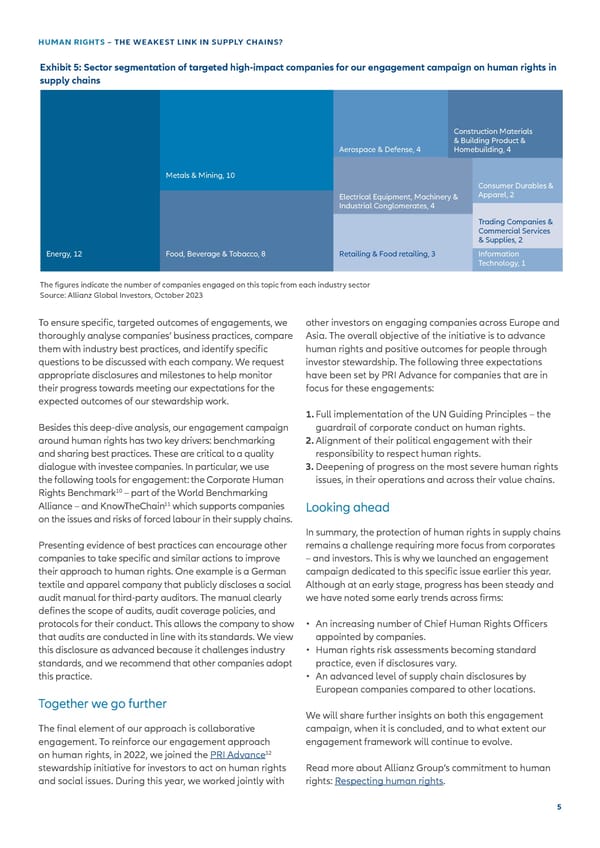HUMAN RIGHTS – THE WEAKEST LINK IN SUPPLY CHAINS? Exhibit 5: Sector segmentation of targeted high-impact companies for our engagement campaign on human rights in supply chains Construction Materials & Building Product & Aerospace & Defense, 4 Homebuilding, 4 Metals & Mining, 10 Consumer Durables & Apparel, 2 Electrical Equipment, Machinery & Industrial Conglomerates, 4 Trading Companies & Commercial Services & Supplies, 2 Energy, 12 Retailing & Food retailing, 3 Information Food, Beverage & Tobacco, 8 Technology, 1 The 昀椀gures indicate the number of companies engaged on this topic from each industry sector Source: Allianz Global Investors, October 2023 To ensure speci昀椀c, targeted outcomes of engagements, we other investors on engaging companies across Europe and thoroughly analyse companies’ business practices, compare Asia. The overall objective of the initiative is to advance them with industry best practices, and identify speci昀椀c human rights and positive outcomes for people through questions to be discussed with each company. We request investor stewardship. The following three expectations appropriate disclosures and milestones to help monitor have been set by PRI Advance for companies that are in their progress towards meeting our expectations for the focus for these engagements: expected outcomes of our stewardship work. 1. Full implementation of the UN Guiding Principles – the Besides this deep-dive analysis, our engagement campaign guardrail of corporate conduct on human rights. around human rights has two key drivers: benchmarking 2. Alignment of their political engagement with their and sharing best practices. These are critical to a quality responsibility to respect human rights. dialogue with investee companies. In particular, we use 3.Deepening of progress on the most severe human rights the following tools for engagement: the Corporate Human issues, in their operations and across their value chains. 10 Rights Benchmark – part of the World Benchmarking 11 Alliance – and KnowTheChain which supports companies Looking ahead on the issues and risks of forced labour in their supply chains. In summary, the protection of human rights in supply chains Presenting evidence of best practices can encourage other remains a challenge requiring more focus from corporates companies to take speci昀椀c and similar actions to improve –and investors. This is why we launched an engagement their approach to human rights. One example is a German campaign dedicated to this speci昀椀c issue earlier this year. textile and apparel company that publicly discloses a social Although at an early stage, progress has been steady and audit manual for third-party auditors. The manual clearly we have noted some early trends across 昀椀rms: de昀椀nes the scope of audits, audit coverage policies, and protocols for their conduct. This allows the company to show • An increasing number of Chief Human Rights O昀케cers that audits are conducted in line with its standards. We view appointed by companies. this disclosure as advanced because it challenges industry • Human rights risk assessments becoming standard standards, and we recommend that other companies adopt practice, even if disclosures vary. this practice. • An advanced level of supply chain disclosures by European companies compared to other locations. Together we go further We will share further insights on both this engagement The 昀椀nal element of our approach is collaborative campaign, when it is concluded, and to what extent our engagement. To reinforce our engagement approach engagement framework will continue to evolve. 12 on human rights, in 2022, we joined the PRI Advance stewardship initiative for investors to act on human rights Read more about Allianz Group’s commitment to human and social issues. During this year, we worked jointly with rights: Respecting human rights. 5
 Human rights Page 4 Page 6
Human rights Page 4 Page 6